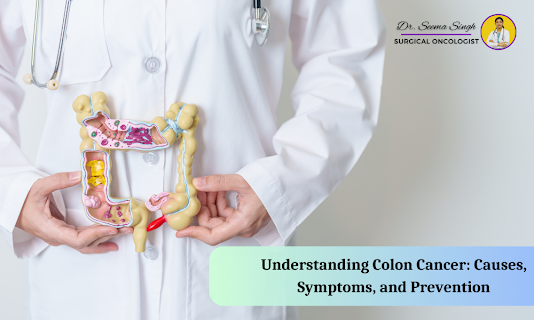Understanding Colon Cancer: Causes, Symptoms, and Prevention
Introduction:
Colon cancer, also known as colorectal cancer, is a type of
cancer that begins in the large intestine (colon) or the rectum. It is one of
the most common types of cancer globally and a leading cause of cancer-related
deaths. This article aims to provide an overview of colon cancer, including its
causes, symptoms, and prevention strategies.
Causes of Colon
Cancer:
Genetic Factors:
Family history plays a significant role in colon cancer risk. Individuals with
close relatives who have had colon cancer are at a higher risk.
Age: Colon cancer
is more common in individuals over the age of 50. However, it can occur at any
age.
Inflammatory Bowel
Diseases: Conditions like Crohn's disease or ulcerative colitis can
increase the risk of developing colon cancer.
Polyps: Colorectal
polyps are growths on the inner lining of the colon or rectum. While not all
polyps become cancerous, certain types may lead to colon cancer over time.
Lifestyle Factors:
Unhealthy lifestyle choices such as a diet high in red or processed meats, low
fiber intake, lack of physical activity, obesity, and smoking can contribute to
the development of colon cancer.
Symptoms of Colon
Cancer:
Change in Bowel
Habits: Persistent changes in bowel habits, such as diarrhea or
constipation, may indicate colon cancer.
Blood in Stool:
Rectal bleeding or blood in the stool can be a sign of colorectal cancer. It is
essential to seek medical attention if this occurs.
Abdominal Discomfort:
Cramps, gas, or pain in the abdomen may occur, and these symptoms should be
evaluated by a healthcare professional.
Weakness and Fatigue:
Unexplained weakness and fatigue can be associated with advanced stages of
colon cancer.
Unintended Weight Loss:
Significant and unexplained weight loss may be a symptom of various cancers,
including colon cancer.
Prevention
Strategies:
Screening:
Regular screening is crucial for early detection and prevention. Colonoscopies,
fecal occult blood tests, and other screening methods can detect polyps or
early-stage cancer.
Healthy Lifestyle:
Adopting a healthy lifestyle, including a balanced diet rich in fruits,
vegetables, and whole grains, regular exercise, and avoiding tobacco and
excessive alcohol, can help reduce the risk of colon cancer.
Genetic Counseling:
Individuals with a family history of colon cancer or specific genetic syndromes
may benefit from genetic counseling to assess their risk and take preventive
measures.
Aspirin Use: Some
studies suggest that regular use of aspirin may help reduce the risk of colon
cancer, but individuals should consult with their healthcare providers before
starting any aspirin regimen.
Conclusion:
Colon cancer is a significant health concern, but early
detection and preventive measures can significantly improve outcomes. Being
aware of risk factors, recognizing symptoms, and adopting a healthy lifestyle
are key components in the fight against colon cancer. Regular screenings,
particularly for those at higher risk, are crucial for catching and treating
the disease in its early stages. Ultimately, a proactive approach to colon
health can contribute to a longer and healthier life.
If you're seeking a specialist in colon
cancer in Ghaziabad, consider consulting with Dr. Seema Singh. She is a certified Robotic Cancer Surgeon in ghaziabad and is currently practicing at
Yashoda Super Speciality Hospitals in Kaushambi, Ghaziabad.

.png)
.png)

Comments
Post a Comment